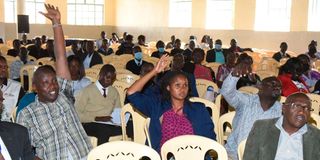This is the year when reforms in education should be taking shape

Members of the public give their views to the Prof David Some-led Presidential Working Party on Education Reform chairman in Eldoret on November 11, 2022.
In the past 20 years, the government has progressively adopted performance management as a tool to enhance service delivery in ministries and parastatals.
The upshot of this is the institutionalisation of the preparation of ministerial and institutional strategic plans. Adoption of the Presidential Working Party on Education Reform’s report will provide the basis for the preparation of five-year strategic plans for the sector.
At the primary and Junior Secondary School (JSS) levels, the thrust of these plans will be to emphasise additional infrastructure, recruitment and deployment of the required teachers.
In addition to that is the management of the emerging group dynamics from integrating the teachers and students of the two levels in the same compound, requiring clear guidelines from the Education ministry and the Teachers Service Commission (TSC) and skills and tack by the principals.
At the Senior Secondary School (SSS) level, there is a lot to plan for in the next two years. For example, the ministry, in collaboration with the school boards of management (BoM), will have to find ways of allocating the three CBC pathways to schools. What criteria will be used? Can one well-equipped school offer the three concurrently?
Stem courses
Would there be a system of ensuring, for example, that equity is enhanced across the country in the distribution of science, technology, engineering and mathematics (Stem) streams so that some counties do not produce the majority of such students while others have none? How shall we be a system of ensuring equity similarly within counties?
All these issues must be sorted out within the intention of the government that over 60 per cent of students joining university from CBC schools will take Stem courses.
The strategic plans of the technical and vocational education and training (TVET) institutions would have to take into account that their students may be drawn from a mixture of G9 and G12 leavers as the ministry has not yet pronounced itself on whether there will be 100 per cent transition from JSS to SSS. If so, they will have to upgrade their courses.
If, however, some students terminate their studies at the JSS level, then TVETs have to plan appropriately to admit such students.
Business courses
Education Cabinet Secretary Ezekiel Machogu’s directive that TVETs phase out business courses within three years is a major issue in the anticipated strategic plans.
Will the ministry expand Stem departments within TVET to attract more learners to compensate for the large number of business students that will be phased out? Where will students who want to study business turn to?
It is possible at the TSC that the preparation of the next strategic plan will be most complicated. To start with, there are well over a dozen counties, mainly in arid areas, with a severe shortage of teachers. TSC, by law, must provide teachers to these schools, failure to which there will be dire economic, moral, social and legal consequences.
Unfortunately, these counties do not have a sufficient number of resident-trained teachers. Traditionally, the TSC would have had to recruit teachers from counties with a surplus of unemployed teachers and post them to these counties.
However, insecurity in some of these counties and condemnation of the delocalisation policy of deploying teachers will immensely constrict TSC from freely staffing these regions—its constitutional independence notwithstanding.
These arid counties could be faced with a situation whereby students may go through school from G1-9 with less than 20 per cent of the teachers required in their schools as is the current situation. How will the TSC balance these countervailing forces?
University faculties have six years to plan how they will teach CBC students. However, the faculties and schools of education should have begun to train their students on the content and methodology of teaching CBC since these are the potential primary and secondary school teachers. The same case for diploma-awarding teacher-training colleges.
This year, therefore, stands out as one that all educational institutions must revise their strategic plans as a matter of necessity.
Mr Sogomo, an education expert, is a former Secretary of TSC. [email protected]. @Bsogomo





